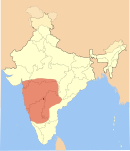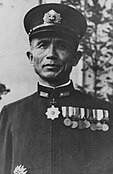Wikipedia:Today's featured article/May 2024
| << | Today's featured articles for May 2024 | >> | ||||
|---|---|---|---|---|---|---|
| Su | Mo | Tu | We | Th | Fr | Sa |
| 1 | 2 | 3 | 4 | |||
| 5 | 6 | 7 | 8 | 9 | 10 | 11 |
| 12 | 13 | 14 | 15 | 16 | 17 | 18 |
| 19 | 20 | 21 | 22 | 23 | 24 | 25 |
| 26 | 27 | 28 | 29 | 30 | 31 | |
May 1
La Salute è in voi! ("Health/Salvation is in you!") was an early 1900s bomb-making handbook associated with the Galleanisti, followers of anarchist Luigi Galleani, particularly in the United States. The anonymously written, Italian-language handbook repackaged technical content from encyclopedias and applied chemistry books into plain directions for non-technical amateurs to build explosives. It wrapped this content in a political manifesto advocating for impoverished workers to overcome their despair and commit to individual, revolutionary acts. American police and historians used the handbook to profile anarchists and imply guilt by possession. It figured prominently in the prosecution of the Bresci Circle, a case that revolved around the anarchists' right to read. Successful political bombers of this era ultimately had career backgrounds in explosives and were not the self-taught amateurs the handbook sought to create. (Full article...)
May 2
The Western Chalukya Empire ruled most of the western Deccan, South India, between the 10th and 12th centuries. This Kannadiga dynasty is sometimes called the Kalyani Chalukya after its regal capital at Kalyani, today's Basavakalyan in the modern Bidar District of Karnataka state, and alternatively the Later Chalukya from its theoretical relationship to the sixth-century Chalukya dynasty of Badami. Prior to the rise of the Western and Eastern Chalukyas, the Rashtrakuta Empire of Manyakheta controlled most of the Deccan and Central India for over two centuries. In 973, seeing confusion in the Rashtrakuta Empire after a successful invasion of their capital by the ruler of the Paramara dynasty of Malwa, Tailapa II, a feudatory of the Rashtrakuta dynasty ruling from Bijapur region, defeated his overlords and made Manyakheta his capital. The dynasty quickly rose to power and grew into an empire under Someshvara I who moved the capital to Kalyani. (Full article...)
May 3
Our Lady of Perpetual Exemption was a legally recognized church in the United States established by the comedian and satirist John Oliver (pictured). Announced on August 16, 2015, in an episode of the television program Last Week Tonight with John Oliver, the church's purpose was to highlight and criticize televangelists, such as Kenneth Copeland and Robert Tilton, who Oliver argued used television broadcasts of Christian church services for private gain. Oliver also established Our Lady of Perpetual Exemption to draw attention to the tax-exempt status given to churches. During his show on September 13, 2015, Oliver announced that the church had received "thousands of dollars" and a variety of other items from viewers, and stated that the Church would be shutting down. All monetary donations were given to Doctors Without Borders. Oliver set up spinoffs of the Church in 2018 and 2021. The segments and later spinoff segments featured the comedian Rachel Dratch as Oliver's fictional wife, Wanda Jo. (Full article...)
May 4
Dorothy Olsen (1916–2019) was an American aircraft pilot and member of the Women Airforce Service Pilots (WASPs) during World War II. She developed an interest in aviation at a young age and earned her private pilot's license in 1939, when it was unusual for women to be pilots. In 1943, Olsen joined the newly formed WASPs as a civil service employee. After training in Texas, she was assigned to the Sixth Ferrying Group in Long Beach, California, where she worked ferrying new aircraft from the factories where they were built to U.S. airbases. She flew more than 20 types of military airplanes, including high-performance fighters – such as the P-51 and the twin-engine P-38 – which she favored over larger aircraft such as bombers. After the war, Olsen retired from flying and moved to the state of Washington, where she married, raised a family, and lived for the rest of her life. In 2009, she was awarded the Congressional Gold Medal honoring her service during the war. (Full article...)
May 5
"Can I Get It" is a song by English singer Adele from her fourth studio album, 30 (2021). Adele wrote the song with its producers, Max Martin and Shellback. It was released by Columbia Records as the album's sixth track on 19 November 2021. A pop song with pop rock and country pop influences, "Can I Get It" has acoustic guitar, drum, and horn instrumentation and a whistled hook. The song is about moving on from a breakup and desiring a committed relationship, exploring Adele's search for true love and a new relationship. Music critics were generally positive about its acoustic portion and lyrics but highly criticised its whistled hook. They thought the brazen pop production of "Can I Get It" catered to the tastes of mainstream radio, which made it an outlier on 30, and compared it to Flo Rida's single "Whistle" (2012). The song reached the top 20 in Sweden, Canada, Switzerland, Australia, Finland, and Norway and entered the top 40 in some other countries. (This article is part of a featured topic: 30 (album).)
May 6
The Take Ichi convoy was an Imperial Japanese Navy convoy of World War II. Under the command of Rear Admiral Sadamichi Kajioka (pictured), the convoy left Shanghai on 17 April 1944, carrying two infantry divisions to reinforce Japan's defensive positions in the Philippines and western New Guinea. United States Navy submarines attacked the convoy on 26 April and 6 May, sinking four transports and killing more than 4,000 soldiers. These losses caused the convoy to be diverted to Halmahera, where the surviving soldiers and their equipment were unloaded. The failure to bring the two divisions to their destination without loss contributed to the Imperial General Headquarters' decision to move Japan's defensive perimeter back by 1,000 km (600 mi). The divisions' combat power was also blunted by their losses, and while they both saw action against United States Army forces, they contributed little to Japan's attempt to defend its empire. (Full article...)
May 7
The Structure of Literature is a 1954 book of literary criticism by Paul Goodman, the published version of his doctoral dissertation. It proposes a mode of formal literary analysis in which Goodman defines a formal structure within an isolated literary work, finds how parts of the work interact with each other to form a whole, and uses those definitions to study other works. He analyzes multiple literary works as examples with close reading and genre discussion. Goodman finished his dissertation in 1940, but took 14 years to publish it. In mixed reviews, critics described the book as falling short of its aims; engaging psychological insight and incisive asides were mired in glaring style issues and jargon that made passages impenetrable or obscured his argument. Though Goodman contributed to the development of the Chicago School of Aristotelian formal literary criticism, he neither received wide academic recognition for his dissertation nor was his method accepted by his field. (Full article...)
May 8
Anna Blackburne (1726–1793) was an English botanist and collector. She was born at Orford Hall in Lancashire into a family of landowners and after her mother's death she remained there with her father, John Blackburne, who had hothouses for exotic plants and an extensive library. Blackburne taught herself Latin so she could read the Systema Naturae of Carl Linnaeus, and created a natural history museum where she collected insects, shells, minerals and birds. She knew the naturalist Johann Reinhold Forster, who instructed her in entomology, and corresponded with other naturalists including Linnaeus. Her brother Ashton, who lived in New York, sent her specimens of North American birds, which were described by the naturalist Thomas Pennant in his Arctic Zoology. After her father's death, Blackburne and her museum moved to nearby Fairfield Hall. After her death, her nephew John Blackburne inherited her collection. Several species are named for her, including the Blackburnian warbler. (Full article...)
May 9
The horned sungem (Heliactin bilophus) is a species of hummingbird native to Brazil, Bolivia and Suriname. It prefers open habitats such as savanna, grassland and garden, and expanded its range into southern Amazonas and Espírito Santo, probably due to deforestation. It is a small hummingbird with a long tail and a short, black bill. The sexes differ in appearance, with males having two shiny red, golden, and green feather "horns" above the eyes, a shiny blue head crest and a black throat with a pointed "beard". The female is plainer, with a brown or yellow–buff throat. It is a nomadic species, responding to the seasonal flowering of its food plants. If a flower's shape is unsuited to the bird's short bill, it may rob nectar through a hole at its base. It also eats small insects. Only the female builds the small cup nest, incubates the two white eggs, and rears the chicks. The species is currently classified as least concern, and its population is thought to be increasing. (Full article...)
May 10
The Felix M. Warburg House is a mansion at 1109 Fifth Avenue on the Upper East Side of Manhattan in New York City. It was built from 1907 to 1908 for the German-American Jewish financier Felix M. Warburg, in the Châteauesque style, and designed by C. P. H. Gilbert. After Warburg's death in 1937, his widow sold it to a real estate developer. When plans to replace it with luxury apartments fell through, ownership reverted to the Warburgs, who donated it in 1944 to the Jewish Theological Seminary of America. In 1947, the Seminary opened the Jewish Museum in the mansion. The house was named a New York City designated landmark in 1981 and was added to the National Register of Historic Places in 1982. In 1993, Kevin Roche constructed an annex to the house in Gilbert's style, built with stone from the same quarry that supplied the original mansion. Critical reviews of the original house's architecture have generally been positive while the extension received a mixed reception. (Full article...)
May 11
Leucippus was a Greek philosopher of the 5th century BCE. He is credited with founding atomism, with his student Democritus. Leucippus divided the world into two entities: atoms, indivisible particles that make up all things, and the void, the nothingness between the atoms. Leucippus's ideas were influential in ancient and Renaissance philosophy. They were a precursor to modern atomic theory, but the two are only superficially similar. Leucippus's atoms come in infinitely many forms, all in constant motion, creating a deterministic world created by the collisions of atoms. The soul is viewed as an arrangement of spherical atoms, cycled through the body by respiration and creating thought and sensory input. Little is known of his life, with a few scholars doubting that he existed, attributing his ideas purely to Democritus. Two works are attributed to Leucippus, The Great World System and On Mind, but all of his writing has been lost except for one sentence. (Full article...)
May 12
Thank You is the second major-label studio album by American singer-songwriter Meghan Trainor. Epic Records released it on May 13, 2016. Trainor wrote it with Jacob Kasher Hindlin and producer Ricky Reed, among others, incorporating various genres to showcase her versatility. Thank You is a pop, dance-pop, and R&B album with themes such as self-acceptance, empowerment, and fame. Trainor promoted it with televised performances and the Untouchable Tour (2016). Thank You's singles included "No" and "Me Too", which reached the top twenty in the US. A few reviewers thought its production was an improvement from her 2015 album Title, while others believed it lacked artistic identity and criticized the lyrical themes. Thank You debuted at number three in the US. It reached the top five in Australia, Canada, New Zealand, Scotland, and the United Kingdom and received Platinum certifications in the US and Canada. (This article is part of two featured topics: Thank You (Meghan Trainor album) and Meghan Trainor albums.)
May 13
Doom is a first-person shooter video game and a reboot of the Doom franchise released on May 13, 2016. Players take the role of an unnamed space marine who battles demonic forces within an energy-mining facility on Mars and in Hell. The game also has an online multiplayer mode and a level editor. Developer id Software and co-developers took eight years to make the game. Their project "Doom 4" was fully overhauled in 2011 to better replicate the tone of the original Doom of 1993. Bethesda Softworks published the 2016 Doom as the first major series installment following Doom 3 in 2004. Its single-player campaign, graphics, soundtrack, and gameplay received considerable praise, while its multiplayer mode drew significant criticism. Doom became a best-seller, with more than two million PC copies sold by the next year. Multiple industry outlets named Doom among 2016's best video games. It received a sequel four years later. (Full article...)
May 14
Mars is the fourth planet from the Sun. It was formed approximately 4.5 billion years ago, is a terrestrial planet and is the second smallest of the Solar System's planets with a diameter of 6,779 km (4,212 mi). A Martian solar day (sol) is 24.5 hours and a Martian solar year is 1.88 Earth years (687 Earth days). Mars has two small and irregular natural satellites: Phobos and Deimos. Carbon dioxide is substantially present in Mars's polar ice caps and thin atmosphere. It has the highest mountain in the solar system, Olympus Mons, and the largest canyon, Valles Marineris. There are large annual temperature swings on the surface, between −78.5 °C (−109.3 °F) and 5.7 °C (42.3 °F) – similar to Earth's seasons. Due to its geological history, the possibility of past or present life on Mars remains of great scientific interest. Mars has been explored by uncrewed spacecraft and rovers, and is an attractive target for future human exploration missions. (This article is part of a featured topic: Solar System.)
May 15
Operation Title was an unsuccessful 1942 Allied attack on the German battleship Tirpitz during World War II. The Allies considered Tirpitz to be a major threat to their shipping and after several Royal Air Force heavy bomber raids failed to inflict any damage it was decided to use Royal Navy midget submarines instead. Operation Title involved a pair of two-man British Chariot manned torpedoes which were transported to Norway on board a small boat named Arthur. Both Chariots were lost when bad weather caused them to detach from Arthur on 31 October. It was not possible for the Allied boat to reach the sea due to German security measures, and Arthur was scuttled. The Allied personnel attempted to escape overland and all but one reached neutral Sweden on 5 November. The other – a British serviceman – was taken prisoner by German forces and murdered on 19 January 1943. Tirpitz was eventually sunk by another bomber raid on 12 November 1944. (Full article...)
May 16
Hö'elün (fl. 1162–1210) was a Mongolian noblewoman and the mother of Temüjin, better known as Genghis Khan. She played a major role in his rise to power. Born into the Olkhonud clan of the Onggirat tribe, Hö'elün was originally married to Chiledu, but was captured shortly after her wedding by Yesügei, an important member of the Mongols, becoming his primary wife. She and Yesügei had three sons and one daughter, as well as Temüjin. After Yesügei was fatally poisoned and the Mongols abandoned her family, Hö'elün shepherded all her children through poverty to adulthood—her resilience and organisational skills have been remarked upon by historians. She continued to play an important role after Temüjin's marriage to Börte. Hö'elün married Münglig, an old retainer of Yesügei, in thanks for his support after a damaging defeat. During the next decades, she arranged marriages, maintained alliances, and was heavily involved in disputes between Genghis, his brothers, and Münglig's sons. (Full article...)
May 17
Raymond Brownell (17 May 1894 – 12 April 1974) was a senior officer in the Royal Australian Air Force (RAAF) and a World War I flying ace. He enlisted in the Australian Imperial Force at the outbreak of World War I and served in the Gallipoli campaign before transferring to the Western Front. Awarded the Military Medal for his actions during the Battle of Pozières, he transferred to the Royal Flying Corps in 1917. Moving with his squadron to Italy, he was awarded the Military Cross and credited with shooting down 12 aircraft. After the war, Brownell returned to Australia and was group captain at the outbreak of World War II. Establishing the RAAF base in Singapore, he returned to Australia in 1941 and was appointed to lead No. 1 Training Group. He was Air Officer Commanding Western Area for over two years, then led the No. 11 Group on Morotai. Retiring from the RAAF in 1947, Brownell became a partner in a stockbroking firm. He died in 1974; his autobiography was published posthumously. (Full article...)
May 18
Tropical Storm Hernan was a short-lived tropical cyclone that caused widespread flooding and destructive mudslides across southwestern Mexico in late August 2020. The eighth named storm of the 2020 Pacific hurricane season, Hernan formed to the southwest of Mexico on August 26. The cyclone peaked with maximum sustained winds of 70 km/h (45 mph) and a minimum atmospheric pressure of 1001 mbar (hPa; 29.56 inHg) before passing just offshore western Mexico and dissipating in the Gulf of California. Despite not making landfall, Hernan dropped extremely heavy rainfall across several states, peaking at nearly 610 mm (24 in) in Jalisco. More than 305 mm (12 in) of rain fell across the Costa Grande of Guerrero from August 24 to 27. A total of 1,674 homes and 9 schools suffered severe damage. A man died after falling off his roof while checking for storm damage. The cyclone caused MXN$594.05 million (USD$26.91 million) in damage across seven states along the Pacific coast of Mexico. (Full article...)
May 19
"Gento" is a song recorded by the Filipino boy band SB19 (pictured). It was written by the band's leader, Pablo, and produced along with his brother Joshua Daniel Nase and the record producer Simon Servida. The lyrics of the pop and hip hop track are themed around empowerment and use gold mining as a metaphor for achieving success. Sony Music Philippines released the song on May 19, 2023, as the lead single from the boy band's second extended play (EP), Pagtatag! (2023). The song won multiple awards, and critics praised its catchiness and lyricism. A dance challenge set to the song became a trend on TikTok. "Gento" achieved top-15 chart positions in the Philippines and on Billboard's World Digital Song Sales chart; SB19 became the first Filipino group to enter the chart. The band promoted the song with a music video depicting them mining for gold and with various live performances, including on their Pagtatag! World Tour. (Full article...)
May 20
City of Champaign v. Madigan is a 2013 case decided by the Appellate Court of the US state of Illinois, ruling that messages sent and received by elected officials during a city council meeting and pertaining to public business are public records subject to disclosure, even when stored on personal electronic devices. It was the first court ruling in Illinois to hold that private messages were subject to disclosure under the state's Freedom of Information Act. The case addressed a public records request from a reporter for The News-Gazette in Champaign, Illinois, who observed city council members and the mayor using their personal electronic devices to send messages during a city council meeting. City officials denied the reporter's request; the case eventually reached the Appellate Court, which held that public officials have to disclose their records, even if they are stored on a personal electronic device or account, but only when acting as a public body, such as during a council meeting. (Full article...)
May 21
Mary Anning (21 May 1799 – 9 March 1847) was an English fossil collector and palaeontologist. She made discoveries of Jurassic marine fossil beds in the cliffs along the English Channel at Lyme Regis, which changed the scientific thinking about prehistoric life and the history of the Earth. Her discoveries included the first correctly identified ichthyosaur skeleton, the first two nearly complete plesiosaur skeletons, and the first pterosaur skeleton outside Germany. Her observations helped prove that coprolites were fossilised faeces and that belemnite fossils contained ink sacs. As a woman, Anning could not join the Geological Society of London and struggled to receive credit for her contributions. Henry De la Beche painted Duria Antiquior based on fossils Anning had found and sold its prints for her benefit. After her death, an article about her life was published in Charles Dickens's literary magazine All the Year Round. A statue of Anning was erected in 2022, and she has been depicted in film and in manga. (Full article...)
May 22
The oyster dress is a high fashion gown created by British fashion designer Alexander McQueen for his Spring/Summer 2003 collection Irere. McQueen's design is a one-shouldered dress in bias-cut beige silk chiffon with a boned upper body and a full-length skirt consisting of hundreds of individual circles of organza sewn in dense layers to the base fabric, resembling an oyster shell. The dress originated as a reinterpretation of the "shellfish dress" designed by John Galliano in 1987, which McQueen had long admired and sought to emulate. Contemporary critical responses to McQueen's oyster dress were positive and it is considered an iconic piece of McQueen's work. Only two copies are known to exist, one held by the Metropolitan Museum of Art in New York City and one by media personality Kim Kardashian. McQueen returned to the oyster dress concept several times over his career, most prominently in his Autumn/Winter 2006 collection The Widows of Culloden. (Full article...)
May 23
The Mount Edziza volcanic complex (MEVC) is a group of volcanoes and associated lava flows in northwest British Columbia, Canada. Located on the Tahltan Highland, the MEVC has a broad, steep-sided lava plateau; its highest summit is 2,786 metres (9,140 feet). Its volcanoes formed over the last 7.5 million years during five cycles of magmatic activity which spanned four epochs; the most recent eruptions took place in the last 11,000 years. Current activity occurs in the form of hot springs. The MEVC has warm summers and cold, snowy winters; snow and ice remain on the highest peaks year-round. Indigenous peoples have lived adjacent to the MEVC for thousands of years. Historically, the local Tahltan people used volcanic glass from the MEVC to make tools and weaponry. Animal species such as birds, rodents, bears, sheep, goats, moose and caribou inhabit the area. A large provincial park dominates the MEVC, which can only be accessed by aircraft or by a network of footpaths. (Full article...)
May 24
George Town is the capital of the Malaysian state of Penang, encompassing Penang Island and surrounding islets. With a population of 794,313 as of the 2020 census, it is the core city of Malaysia's second-largest metropolitan area, which has a population of 2.84 million. George Town serves as the commercial centre for northern Malaysia. Its technological sector, anchored by hundreds of multinational companies, has made the city the top exporter in the country. It was the first British settlement in Southeast Asia, and its proximity to maritime routes along the Strait of Malacca attracted an influx of immigrants from various parts of Asia. In 1974, the city was merged with the rest of the island, throwing its administrative status into doubt until 2015, when its jurisdiction was reinstated and expanded to cover the entire island and adjacent islets. UNESCO designated the city centre of George Town as a World Heritage Site in 2008. (Full article...)
May 25
The 2019 FA Cup final was an association football match between Manchester City and Watford for the 138th FA Cup final. In the 21st minute, Abdoulaye Doucouré's shot struck Vincent Kompany's arm; the referee declined to award a penalty and showed Doucouré the first yellow card of the game for his protests. David Silva scored the first goal from a header and Gabriel Jesus side-footed the ball for the second goal. At 61 minutes City extended their lead with a goal from substitute Kevin De Bruyne (pictured), and seven minutes later Jesus scored on the counter-attack. Raheem Sterling scored twice at the 81st and the 87th minutes and the match ended 6–0 to Manchester City. De Bruyne was named the man of the match. It was only the third time that a team has scored six goals in an FA Cup final and the margin of victory is the joint-largest in an FA Cup final. The win completed a domestic treble for Manchester City, who already won the League Cup and the Premier League that season. (Full article...)
May 26
"The Day Before the Revolution" is a science fiction short story by American writer Ursula K. Le Guin (pictured). First published in Galaxy in August 1974, it was republished in Le Guin's The Wind's Twelve Quarters (1975). Set in her fictional Hainish universe, the story has strong connections to her novel The Dispossessed (also 1974), and is sometimes referred to as a prologue to the novel. The story follows Odo, an aging anarchist, who over the course of a day relives memories of her life as an activist as she learns of plans for a general strike the next day. The strike is implied to be the start of the revolt leading to the idealized anarchist society based on Odo's teachings depicted in the novel. The story was critically well-received. It won the Nebula and Locus Awards for Best Short Story in 1975, and was also nominated for a Hugo Award. Multiple scholars commented that it represented a shift in Le Guin's writing toward non-linear narrative structures and works infused with feminism. (Full article...)
May 27
SMS Lothringen was the last of five pre-dreadnought battleships of the Braunschweig class built for the Imperial German Navy. Launched in May 1904, she was named for the then-German province of Lothringen. The ship was armed with a battery of four 28 cm (11 in) guns and had a top speed of 18 knots (33 km/h; 21 mph). She was to be replaced in July 1914 by dreadnought battleships but World War I prevented her retirement. The ship and the rest of II Squadron joined the dreadnoughts of the High Seas Fleet to support a raid on Scarborough, Hartlepool, and Whitby in December 1914. She primarily served as a guard ship in the German Bight; in poor condition by 1916, she was withdrawn from fleet service in February. She thereafter patrolled the Danish straits until replaced by the battleship Hannover in September 1917. After the war, she was converted into a depot ship for F-type minesweepers and placed in reserve in March 1920. (This article is part of a featured topic: Battleships of Germany.)
May 28
Nicholas of Worcester (died 1124) was the prior of the Benedictine priory of Worcester Cathedral (crypt pictured) from about 1115 until his death. He was born around the time of the Norman Conquest. It is not known who his parents were, but William of Malmesbury wrote that he was "of exalted descent", and it has been argued that he was a son of King Harold Godwinson. Nicholas was the favourite pupil of Wulfstan, the bishop of Worcester, who brought him up. Wulfstan was influential in transmitting Old English culture to Anglo-Norman England, and Nicholas carried on this work as prior. He was respected by the chroniclers William of Malmesbury, John of Worcester and Eadmer for his assistance with their histories. Nicholas was an English monk at a time when both Englishmen and monks rarely received promotion in the church, and when Bishop Theulf of Worcester died in October 1123, Nicholas led an unsuccessful attempt of the monks of the priory chapter to be allowed to choose the next bishop. (Full article...)
May 29
The Beulé Gate is a fortified gate leading to the Propylaia of the Acropolis of Athens, Greece. It was constructed largely of repurposed material taken from the 4th-century BCE Choragic Monument of Nikias and integrated into the Post-Herulian Wall, a late Roman fortification built around the Acropolis in the years following the city's sack by the Germanic Heruli people in 267 or early 268 CE. Its construction marked the beginning of a new phase in the Acropolis's use, in which it came to be seen more as a defensive position than a religious sanctuary. During the medieval period, the gate was further fortified, before being built over with a bastion in Ottoman times. The monument was discovered by the French archaeologist Charles Ernest Beulé on 29 May 1852, and excavated in 1852 and 1853. Archaeologists and Greek commentators criticised the aggressive excavation – particularly the use of explosives. In modern times, the gate has served primarily as an exit for tourists from the Acropolis. (Full article...)
May 30
The Boundary Fire was a 2017 wildfire in Arizona that burned 17,788 acres (7,199 ha) of the Coconino and Kaibab National Forests. The fire was ignited on June 1 when lightning struck a spot on the northeast side of Kendrick Peak within the Coconino National Forest. The fire spread rapidly because of high temperatures, steep terrain, leftovers from a wildfire in 2000, and high wind speeds. The winds blew smoke over local communities and infrastructure, leading to the closure of U.S. Route 180 from June 8 to June 21. Smoke was also visible from the Grand Canyon. The Boundary Fire burned out on July 3, 2017, after 32 days of firefighting. The cost of managing the fire was $9.4 million (equivalent to $11.5 million in 2023). Damage to the area's foliage increased the risk of landslides into 2018. The Boundary Fire was one of 2,321 wildfires in Arizona in 2017 that burned a total of 429,564 acres (173,838 ha). (Full article...)
May 31
The siege of Guînes took place from May to July 1352 when a French army under Geoffrey de Charny unsuccessfully attempted to recapture the French castle (pictured) at Guînes which had been seized by the English the previous January. The siege was part of the Hundred Years' War and took place during the uneasy and ill-kept truce of Calais. The strongly fortified castle had been taken by the English during a period of nominal truce and the English king, Edward III, decided to keep it. Charny led 4,500 men and retook the town but was unable to either recapture or blockade the castle. After two months of fierce fighting, a large English night attack on the French camp inflicted a heavy defeat and the French withdrew. Guînes was incorporated into the Pale of Calais. The threat posed by this enclave caused the French to garrison 60 fortified positions around it, at ruinous expense. The castle was besieged by the French in 1436 and 1514, but was relieved each time, before falling to the French in 1558. (Full article...)


























